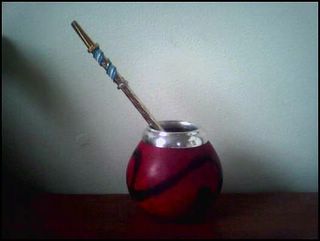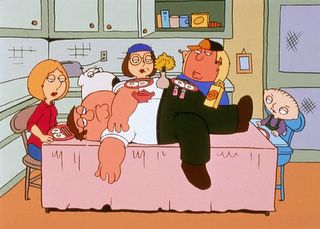Currently Reading:
TITLE: A People's History of the United States
AUTHOR: Howard Zinn

TITLE: Game Coding Complete
AUTHOR: Mike McShaffry




Did anyone else hear that there's now twelve food pyramids instead of just one?? And I thought it was hard enough to keep track of the single one! They say that it's to account for all different types of people, which I guess I can see, but I mean a healthy diet is a healthy diet, period. I would think that if you tried to eat pretty balanced meals complete with green vegetables and some protien, you know like Mom used to make, you'd be pretty set, right? I'll have to do some more research, but I dunno, I'm just gonna stick with my try-to-eat-lots-of-vegetables plan for now. That's hard enough for me to adhere to...
In further Coercion news, last night I found this Noam Chomsky quote (re: the first Gulf/Bush War) that I found to be highly appropriate:
"Support our troops. Who can be against that? Or yellow ribbons. Who can be against that? The issue was, Do you support our policy? But you don't want people to think about that issue. That's the whole point of good propaganda. You want to create a slogan that nobody's going to be against, and everybody's going to be for. Nobody knows what it means because it doesn't mean anything. Its crucial value is that it diverts your attention from a question that does mean something: Do you support our policy? That's the one you're not allowed to talk about. So you have people arguing about support for the troops? 'Of course I don't not support them.' Then you've won."
But, then again, I tend to find all Noam Chomsky quite appropriate. Him, and Howard Zinn. -- Did I tell you I met Zinn, once? He signed my copy of A People's History (which I'm still "currently reading," arg, I need to get moving on that) and we discussed the merits of oatmeal-butterscotch cookies. Quite fun - he's a great guy.
Noam, I have yet to meet. But I wouldn't mind!



"The wave, a stadium-wide cheerleading phenomenon, first emerged quite
unexpectedly at a University of Washington homecoming game in 1981. Fans stood
and raised their arms in sequence as the 'wave' passed around the entire arena
again and again."
Rushkoff goes on to talk about how it was subsequently "stolen" and bastardized by advertisers and really lost its charm for the people who loved its spontenaeity. Ugh - they always seem to manage to shit stuff up, don't they?
I also learned this about revolving doors:
"Store owners learned that more entrances, and more activity at these entrances,
drew more traffic. The sight of other human forms in motion attracts
people. This is why revolving doors, which highlight such motion, becamse
so popular."



"[Mannequins] create an atmosphere of reality that aroused enthusiasm and acted in an autosuggestive manner."I just don't get it - did writers back then also tend to be social psychologists, or did someone for some reason consider them experts on the human mind and his antics just because they had written a good book or two? Odd, very odd...
...that L. Frank Baum, author of The Wonderful Wizard of Oz, was commissioned in the 1940's to design department stores and malls? They wanted to create a sense of stepping into another world, and apparently Baum had all these great ideas! Weird. I never knew he was anything more than an author - a good one, mind you.
Ah, the incredible things I'm learning from this book.



"Programmers can reach...conclusions by watching our eye movements. The brain is divided into two hemispheres: The left hemisphere controls the right side of the body and deals with logical, rational functions; the right hemisphere controls the left side of the body and is believed to carry out creative and emotional tasks. If I ask you to add 127 and 667 in your head, chances are you will look up and to the right -- because you are accessing the left hemisphere of your brain. If I ask you to think about how you felt the first time you made love, you will probably look up and to the left.--WHAT?!? Well, I'm definitely going to try that movie-theater thing. But it just bugs me out that people can be using me (everyone!) to their advantage just by the position they're standing in. Oh good lord I hope this book eventually points out ways that one can avoid being so coerced...!"NLP [Neuro-linguistic programming] books call these eye motions "accessing cues." NLP practitioners use these cues to understand more about us than our words might indicate, however well we have attempted to edit ourselves. If a car salesman asks if you like a more expensive model better than a cheaper one and you look to the right before answering no, he knows you're lying.
"Much more deviously, programmers can exploit those visual accessing cues to enhance their powers of persuasion. According the principles of NLP, neural cues work in both directions. Thus, if a person looking to the left is accessing emotional centers in the brain, then a salesperson should stand to your left when he wants to appeal to your emotions. If he wants to appeal to your rational sensibilities, he will stand to your right. (Try sitting on the right side of a movie theater. You will be forced to look toward the left to see the screen, and you will be more likely to engage emotionally. Sit on the left for documentaries.) By properly positioning your eyes, the coercer can access the part of your brain that suits his needs."
Douglas Rushkoff, Coercion



















Your "best"! Losers always whine about their best. Winners go home and fuck the prom queen.




"The market is a tool, and a useful one. But the worship of this tool is a hollow faith. Far more important than any tool is what you make with it."-Eric Schlosser"I do not believe that the great object of life is to make everything cheap."-Henry M. Teller, R-CO, during the Sherman Antitrust Act debate
